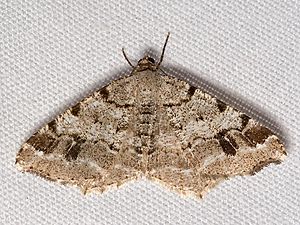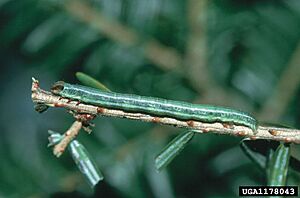Hemlock angle facts for kids
Quick facts for kids Hemlock angle |
|
|---|---|
 |
|
| Scientific classification | |
| Genus: |
Macaria
|
| Species: |
fissinotata
|
| Synonyms | |
|
|
The Macaria fissinotata, also known as the hemlock angle moth, is a fascinating insect. It belongs to a group of moths called Geometridae. These moths are often called "inchworms" in their caterpillar stage because of how they move.
You can find the hemlock angle moth across a large part of North America. It lives in areas from Nova Scotia in Canada, south to Georgia in the United States. Its range also stretches west to Kentucky and north into Ontario.
The Hemlock Angle Moth
What It Looks Like
The hemlock angle moth is a medium-sized moth. Its wingspan is usually between 22 and 25 millimeters. That's about the length of a small paperclip!
When It Flies
These moths are active during the warmer months. In most places, you can see them flying from May to September. If you are in Quebec, they typically fly from May to July.
What's in a Name?
The scientific name for this moth is Macaria fissinotata. The second part of its name, fissinotata, comes from two Latin words. "Fissus" means "cleaved" or "split." "Notatus" means "mark."
This name likely refers to a special mark on the moth's front wings. This mark often looks like it is split into two parts. It's a cool way to describe a unique feature of the moth!
Its Life Cycle
Like all moths, the hemlock angle moth goes through different life stages. It starts as an egg, then hatches into a larva (caterpillar). The caterpillar then turns into a pupa, and finally, it emerges as an adult moth.
The caterpillars of the hemlock angle moth are quite picky eaters. They mostly feed on the leaves of certain trees. These include Tsuga species, which are also known as hemlock trees. They also enjoy eating Picea trees and Abies balsamea, which is the balsam fir.


